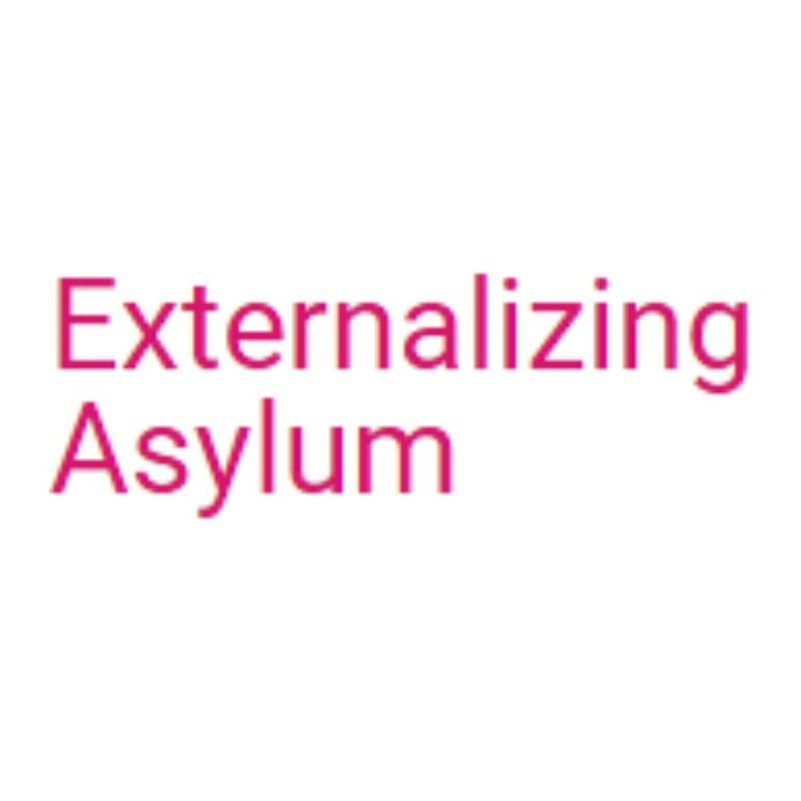Outsourcing cruelty: the offshoring of migration management
Global north states are systematically outsourcing asylum processing and detention to countries with poor human rights records, paying authoritarian regimes billions to intercept, detain and receive refugees who would otherwise reach safety. What was once an exceptional response is in danger of becoming normalised as a standard practice. These policies violate international law, strengthen dictatorships and make migration riskier. As wealthy states abandon their humanitarian obligations, desperate people are being made bargaining chips in transactional agreements. Civil society is mobilising resistance and being targeted for repression in response. Urgent action is needed to restore asylum rights and human dignity.
Under the Trump administration’s new policy, thousands of Afghans who fled to the USA after the Taliban took over in August 2021 face the prospect of deportation to countries they’ve never known. Meanwhile in Europe, asylum seekers whose applications have been rejected risk being held indefinitely in Italian-run detention centres in Albania. Far from isolated incidents, these are the consequences of a calculated policy shift.
Global north states are increasingly finding ways to remove migrants to other countries. Wealthy democracies are striking multimillion-dollar deals with authoritarian states, paying them to intercept, detain and receive migrants and refugees who’d otherwise be safe in their territories. Rather than managing arrivals and processing asylum claims themselves, they’re outsourcing these responsibilities to other states. Global north states are turning irregular arrivals into someone else’s problem while allowing dictators and warlords to exchange cooperation for cash and impunity. Vulnerable people seeking protection are being made bargaining chips and left exposed to violence and human rights violations.
These arrangements violate core principles of international law, including the right to seek asylum and the prohibition against returning people to places where they’ll be in danger. They also create a perverse protection racket: once global north governments label a country safe for deportations, they’re far less likely to criticise its human rights record.
Rather than stopping migration, outsourcing arrangements are making it deadlier, forcing desperate people to take increasingly dangerous routes and benefiting criminal smuggling networks that pay no heed to human rights. Meanwhile, civil society organisations, activists and journalists documenting these failures are facing mounting repression.
How it works
Arrangements range from formal agreements to informal understandings, but they share a lack of oversight and accountability, leaving ample scope for abuses and limiting civil society’s ability to monitor and intervene.
The most common practice is interception before arrival. This is standard procedure for the European Union (EU), which has spent billions turning non-EU countries into buffer zones, funding their border forces and coastguards to try to stop migrants before they reach EU territory.
States are also increasingly embracing offshore processing, which involves diverting asylum seekers to other countries for their claims to be assessed. This approach was pioneered by Australia and many global north states are now embracing it. People may be kept in detention for prolonged spells, denied access to legal support and left vulnerable to violence and torture in facilities designed more for containment than protection.
Australia’s precedent
Australia pioneered the offshoring of migration management in 2001, when it signed agreements with Nauru and Papua New Guinea to host migrants intercepted at sea. In what became known as the ‘Pacific solution’, Australia started sending asylum seekers attempting to reach its shores to Pacific island detention centres.
The Australian model established troubling precedents: indefinite detention in harsh conditions, denial of access to legal representation and the use of remote locations to limit media scrutiny and civil society oversight. Many detainees spent years in limbo, often developing severe mental health problems. Despite international condemnation, the government persisted with its policy, dramatically reducing the number of asylum seekers trying to reach Australia by boat. This provided a blueprint for other countries to borrow.
The Manus Regional Processing Centre, located in Papua New Guinea, was formally closed in October 2017 after the Papua New Guinea Supreme Court ruled it unconstitutional, but some 64 people subject to offshore processing were effectively abandoned in Papua New Guinea with limited support and resettlement options. Meanwhile, the Nauru facility remains operational, with over a hundred people detained there as of January 2025, the highest number of asylum seekers held on the island in over a decade.
Return agreements for non-nationals are another way global north states seek to externalise the management of migration. States send migrants to countries they’ve no connection to, apart from having transited through their territory. These arrangements often bypass due process protections, enabling rapid returns without proper legal procedures or individual assessment of protection needs. An example of this is Spain’s 1992 agreement with Morocco, which allows it to return any migrants who’ve entered Spain from Morocco – not just Moroccan citizens, but those from other countries, mostly in sub-Saharan Africa, who’ve passed through Morocco on their way to Spain.
Mass deportations to willing countries, as is happening under the Trump administration, represent the most extreme evolution of these approaches. Abandoning any pretence of protection, such policies treat human beings as unwanted cargo to be shipped anywhere that accepts payment. A particular component of the Trump approach is its targeting of longtime residents: rather than focus on recent arrivals, it seeks to uproot individuals and families who’ve spent years building lives and careers and have strong community ties.
Europe: from crisis response to systematic policy
When large numbers of people fleeing conflict and repression in Afghanistan, Iraq and Syria reached Europe in 2015, systems came under exceptional strain. European states responded by striking deals with global south counterparts.
The EU reached its first major migration control deal with Libya in 2015. The agreement means the EU provides funds and training to the Libyan Coast Guard to intercept migrants at sea before they could reach EU waters. This deal established the template for outsourcing border control to countries with poor human rights records, enabling systematic pushbacks to Libya despite well-documented evidence of inhumane detention centres, slavery and torture. The agreement effectively created a policy of containment that bypassed EU obligations under international refugee law by ensuring asylum seekers never reach European territory to claim protection.
The EU’s 2016 deal with Turkey expanded the scheme: anyone arriving in Greece irregularly was to be immediately returned to Turkey. In return, the EU committed to providing €6 billion (approx. US$6.5 billion) to supposedly improve the humanitarian situation for refugees in Turkey and promised visa liberalisation for Turkish citizens – a pledge never fulfilled. Since then, EU financial support has been renewed multiple times and now exceeds €10 billion (approx. US$10.8 billion). Turkey’s deeply repressive government has used this agreement to extract further concessions, sometimes allowing migrants through its borders to focus pressure on Europe.
More agreements followed with countries serving as transit routes to the Mediterranean and into Europe, including Morocco in 2023, Tunisia in 2023, Egypt in 2024, Lebanon in 2024 and Mauritania in 2024. The EU has provided billions to train border security and coastguard personnel, build migration processing centres and conduct sea and air patrols to intercept boats carrying people before they reach the continent.
The willingness to bankroll these partnerships reveals the extent to which migration control has become divorced from the EU’s supposed commitment to human rights and democratic governance. The Tunisia deal is emblematic: the EU embraced President Kais Saied’s government despite its systematic imprisonment of civil society activists, journalists and opposition politicians, empowering a government that has whipped up dangerous anti-migrant sentiment that has led to violent attacks against Black African migrants and refugees.
The EU Pact on Migration and Asylum, adopted in 2024, created what it calls safe return hubs to speed up expulsions.
The normalisation of outsourcing has accelerated with the rise of far-right politics across Europe. The UK’s Rwanda plan, though ultimately cancelled following a change of government and after years of legal challenges and political controversy, legitimised the idea of offshore processing by demonstrating that even established democracies were willing to send asylum seekers to distant countries with poor human rights records. The scheme would have diverted asylum seekers to authoritarian Rwanda for claim processing, creating indefinite detention thousands of miles from legal support or advocacy networks.
The hostility towards migrants and refugees legitimised by the plan has continued to intensify, with far-right groups mobilising up to 150,000 people at an anti-migrant protest in London in September.
Italy’s right-wing nationalist government has attempted to implement a similar scheme to process asylum claims in Albania in facilities that blur the line between processing centres and detention facilities, although the scheme has faced legal opposition and court rulings have gone against the Italian government. The Netherlands is exploring deportation agreements with repressive Uganda, which would serve as a deportation hub where rejected African asylum seekers would wait to return to their countries of origin in exchange for financial compensation.
Multiple European states are also tightening policies to reject asylum seekers at borders through accelerated procedures that limit due process protections. What was once politically unthinkable has become mainstream discourse and practice.
European civil society has long resisted these regressive trends. Legal advocacy groups have challenged the EU’s agreements with Libya and Turkey in the European Court of Human Rights and domestic courts. Activist networks provide real-time rescue coordination for migrants at sea, while some organisations conduct search-and-rescue operations, directly countering EU-funded interception efforts. Civil society volunteers provide humanitarian aid at reception centres and refugee camps. Civil society has exposed systematic human rights violations in EU-funded detention facilities and highlighted the illegal nature of pushback operations.
But they face backlash for doing so. Multiple EU countries have criminalised search-and-rescue operations, harassing organisations, seizing their assets and criminalising their staff. Governments have denied journalists and researchers access to detention centres and processing facilities, and prosecuted humanitarian workers under anti-smuggling laws for providing aid to migrants. Despite the restrictions, advocacy networks keep exposing the human costs of these policies.
The USA: industrial scale outsourcing
The USA has a long history of outsourcing asylum processing, but these practices have reached unprecedented levels under the Trump administration, which has put in place a system of mass removals to countries people have no connection with.
Since taking office in January 2025, Trump has invoked an obscure provision in US immigration law to deport undocumented immigrants. This approach relies on offering financial incentives to other states, primarily in the global south, or applying diplomatic pressure to compel them to accept US deportees. Around a dozen states have accepted such deals, including Costa Rica, El Salvador, Guatemala, Honduras and Paraguay, along with countries as distant as Eswatini, Kosovo, Rwanda, South Sudan and Uganda. This geographic spread drops any pretence that the policy is about transit routes; it’s nakedly about who’s willing to accept money in exchange for unwanted deportees.
The Trump administration is prepared to deport people to war zones and authoritarian states, and directly to prison. Under its expanded deportation programme, it agreed to a US$6 million payment for El Salvador to house Venezuelan deportees in its Terrorism Confinement Centre (CECOT), an overcrowded jail notorious for human rights abuses. In March, the US government accused 238 Venezuelan men of being gang members to justify their expedited removal to El Salvador. After being detained based on little more than tattoos and fashion choices, the deportees were sent to CECOT, before being returned to Venezuela in July as part of a prisoner swap that raised further questions about the use of migrants as diplomatic pawns.
In August, Rwanda received its first seven deportees under Trump’s programme. At around the same time, Uganda signed a formal agreement with the US government and now faces pressure to accept high-profile deportees such as Kilmar Ábrego García, the Maryland resident who was returned to the USA from CECOT in June.
These are clearly transactional arrangements. States are rewarded through direct payments, trade concessions, sanctions relief and diplomatic benefits. Uganda’s agreement came amid US sanctions on government officials, suggesting the country may have traded migrant acceptance for improved diplomatic relations and potential sanctions relief. Rwanda’s deal coincided with US-brokered talks with the Democratic Republic of the Congo over its conflict, indicating the deportation agreement was being used to secure cooperation in unrelated diplomatic negotiations.
Trump’s approach extends beyond deportations to encompass sweeping travel bans. In June, the government announced entry restrictions for people from 19 countries, with internal memos revealing plans to potentially add 36 more, primarily in Africa, if they fail to meet US requirements on vetting and cooperation with deportations. The State Department has indicated that a state’s willingness to accept nationals of other countries deported from the USA will influence these decisions.
Civil society resistance
Trump’s strategy of targeting established migrants has sparked unprecedented defensive responses from local communities who’ve seen neighbours, coworkers, friends and fellow congregants dragged away. Across the USA, people have mobilised in ways that transcend traditional political divides, with teachers protecting students’ families, employers refusing to cooperate with raids, religious leaders offering sanctuary and neighbourhoods forming mutual aid networks and early warning systems. These reactions recognise that the deportations aren’t abstract policy measures but direct attacks on the social fabric.
In response to Immigration and Customs Enforcement (ICE)’s ramped-up raids to detain migrants, with arrest quotas targeting 3,000 people a day, people have protested in cities across the USA. Resistance has been particularly intense in sanctuary cities – jurisdictions that limit cooperation with federal immigration authorities and restrict local police from enforcing immigration law – such as Boston, Chicago, Los Angeles, New York and San Francisco. These cities have been primary targets for federal operations to arrest migrants, including ‘Patriot 2.0’ in Boston and ‘Midway Blitz’ in Chicago, prompting local officials to file lawsuits and thousands of residents to take to the streets to defend their neighbours.
Activism has gone beyond street protests to target the broader deportation infrastructure. ICE raids at day labourer gathering sites such as Home Depot car parks and workplaces including clothing manufacturers sparked protests, with protesters confronting agents and trying to block deportation vehicles. These confrontations have led to clashes where agents used smoke devices to disperse crowds. The scale of resistance prompted the Trump administration to deploy 4,000 national guard troops and 700 marines to Los Angeles, an unprecedented federal military intervention in response to civil protests.
Airport protests have targeted deportation flights in Connecticut, Maryland and other states, with activists launching boycott campaigns against Avelo Airlines, the first commercial passenger airline to sign a contract with ICE for deportation flights. Local activism forced ICE deportation flights to relocate from Massachusetts to New Hampshire after protests targeted Signature Aviation, a logistics company that services deportation flights.
Other actions have included protests at ICE detention facilities and ICE recruitment events, with students at universities such as Cal Poly Pomona forcing the postponement of job fairs where ICE recruiters were present and New York University cancelling ICE recruitment interviews following a student petition.
Activists have also launched corporate accountability campaigns targeting companies that profit from deportations, including pressure on Bill Gates over his investment in Signature Aviation.
Reclaiming humanity in migration policy
The current trajectory is inhumane and unsustainable. As article 14 of the Universal Declaration of Human Rights makes clear, every person has the right to seek asylum. To exercise this right, people need to be able to leave their country and get to a safe place. When states block access or send people back to danger, they violate their obligations under the 1951 Refugee Convention and customary international law.
By outsourcing migration management, supposedly democratic and rights-respecting global north states avoid their international obligations and strengthen authoritarian regimes. By declaring countries safe for migrants and giving authoritarian governments resources, they strengthen their repressive capacities.
Rather than suppress migration, these policies create new risks, as desperate people seek increasingly dangerous routes to reach their destination – and encounter xenophobia and racism that is increasingly legitimised.
In country after country, civil society has spoken out against anti-migrant rhetoric and policies, making clear politicians are scapegoating migrants and refugees instead of getting to grips with complex economic and political problems.
Instead of blaming migrants for domestic problems, global north states must provide safe and legal pathways for migration and integration, including through humanitarian visas, family reunification programmes and sponsorship schemes that guarantee protection for those who need it. Spain’s recent decision to grant legal status to 900,000 irregular migrants demonstrates that progressive integration policies are possible.
Global north states must act according to the legal and humanitarian obligations that define civilisation. The cost of inaction extends beyond individual tragedies to the erosion of international law, the strengthening of authoritarian regimes and the abandonment of collective humanity.
OUR CALLS FOR ACTION
-
Global north states must suspend all agreements to offshore migration management, cease funding interception operations and end the practice of deporting asylum seekers to unsafe countries or countries with no connection to them.
-
Civil society must intensify documentation of migrant rights abuses, expand legal challenges to deportation flights and detention facilities and develop transnational networks to expose the human costs of these policies.
-
International human rights bodies must establish investigation mechanisms into the offshoring of migration management, issue binding legal opinions and refer systematic breaches of the 1951 Refugee Convention to international courts.
For interviews or more information, please contact research@civicus.org
Cover photo by Leonardo Fernandez Viloria/Reuters via Gallo Images





